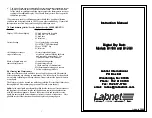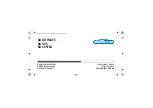
Ignitability of Coating Materials
Ignitability
Ignitability
Ignitability of
of
of Coating
Coating
Coating Materials
Materials
Materials
Per EN 50059
From the Physikalisch-Technische Bundesanstalt, Braunschweig, Germany, June 26, 2019.
General
General
General
The fire and explosion protection of spraying systems can be facilitated considerably when processing
coating materials with a low portion of solvents and a high flash point (generally water-based paints),
provided that the spray cloud of the coating materials are considered to be non-ignitable. Substantial
research has shown that the ignitability of spray clouds depends on the composition of the coating materials
made mainly of water, solvents, and solids. The following classification has been established:
Non
Non
Non---ignitable
ignitable
ignitable coating
coating
coating materials
materials
materials
Coating materials of this group have the following composition:
[% H
2
O] > 1, 70 x [% LM] + 0,96 x [% ORG], (all in % by weight)
where
H
2
O: water;
LM: the entire liquid phase, including liquids with flash points above 60 °C and those liquids not
not
not listed in
the safety data sheet, in which case the entire liquid phase is ignitable in the sprayed state;
ORG: solid phase which is ignitable in the sprayed state (ignitable inorganic or ignitable organic solids)
including the solids which have an ignitable inorganic or ignitable organic coating.
Non-ignitable coating materials act like water in the liquid phase and in the sprayed state. If the rinsing and
thinner liquids correspond to this category, too, no explosion protection is necessary. Coating materials of
this group are classified as being non-ignitable liquid coating material.
A fire extinguishing equipment is not required for spraying systems processing coating materials which are
classified to be non-ignitable. However, this does not affect the fire protection as a whole. Even these
coating materials may resume ignitability after being partially dried. Moreover, water-based coating materials
will burn when strongly exposed to a fire which had been initiated by other sources, and thus present a
certain fire load.
136
3A8493A





































